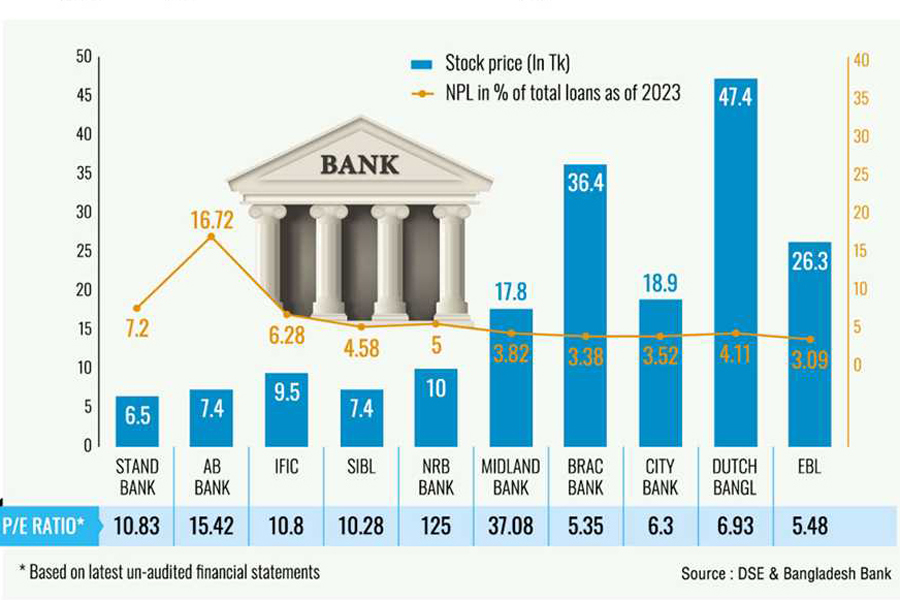
Published :
Updated :

It is worrisome that 15 out of 36 listed banks are trading below the face value of Tk 10 per share but what is more troubling is that some of them still have a P/E ratio higher than the industry's.
For example, AB Bank closed at Tk 7.4 per share on the Dhaka Stock Exchange (DSE) on Thursday, way below the face value. Its price-to-earnings (P/E) ratio, which measures the company's current stock price relative to its earnings per share, is 15.42 based on the first-quarter earnings of this year, whereas the banking sector's P/E ratio is 9.34.
Even at lower than face value, the stock of AB Bank is deemed to be overvalued. Investors should not be expecting a good return on investment in the stock for the company's poor financial performance.
A reverse picture is also there; a bank that has secured a profit growth over the years by containing non-performing loans (NPLs) is also trading below the face value on the bourses. Exim Bank is one of those, with NPLs amounting to 3.47 per cent of total loans it disbursed and the stock price closing at Tk 8.3 per share on Thursday.
That is because the banking sector overall has earned a bad reputation, with a series of scams and other financial frauds and ballooning NPLs.
"The problem is the government says there are ill banks but doesn't disclose their names. So, people gather information from various sources and make decisions based on them," said Saiful Islam, president of the DSE Brokers Association, Bangladesh (DBA).
"I believe the government should disclose the names of the bad banks."
NPL is a very important indicator of a bank's performance.
According to Md Shakil Rizvi, managing director of Shakil Rizvi Stock, it is imperative to see if a bank has complied with the requirement of provisioning against bad loans in its financial statements.
As of December 2023, every Tk 9 out of Tk 100 provided in loans turned out to be bad loans, according to BB.
As a result, many lenders are increasingly relying on borrowing from the central bank to maintain operations.
On June 13, the last working day ahead of Eid-ul-Azha, banks borrowed a record Tk 224.06 billion. The trend continued even after Eid, as banks borrowed a total of Tk 150.51 billion on June 27 and Tk 164.84 billion on June 30.
Excess cash in banks dropped to Tk 84.09 billion in April from Tk 199.66 billion in December 2023, which was Tk 320.59 billion in December 2021, according to Bangladesh Bank data.
According to the BB, 90.47 per cent of the issued physical notes were outside banks as of April 30.
On top of that, persistent inflationary pressures have eroded the purchasing power of the currency, prompting depositors to withdraw cash.
Meanwhile, the Bangladesh Bank's dollar sales from the reserves, increased investment in Treasury bills and cash flowing out of the banking system deepened the crisis.
"People don't want to keep money in banks. They are afraid that they will not get the money back. Equity investment is riskier than keeping deposits. So, investors turned away from bank stocks," said one of the leading asset managers of the country, who did not wish to be named.
However, more than half of the listed banks posted a double-digit profit growth in 2023, as their net interest income surged after the removal of the interest rate cap.
But many of them are doing poorly on the exchanges.
Dutch-Bangla Bank's profit grew 42 per cent year-on-year to Tk 8.02 billion in 2023, highest since its listing in the stock market in 2001, riding on high interest income. BRAC Bank logged the highest profit of Tk 8.27 billion in 2023 among all listed banks, having experienced a 35 per cent jump in income from the year before. The City Bank's consolidated profit stood at Tk 6.38 billion in 2023, marking a 33.5 per cent surge from the year before.
Mr Rizvi said there was a time when the stock market turnover leader was the banking sector.
"That's no longer the case. Investors think banks' financial health is not good. They are reluctant to invest in bank shares. But not all banks are bad. Maybe 10 to 12 per cent of the banks have become sick whereas the entire sector is feeling the heat."
farhan.fardaus@gmail.com


 For all latest news, follow The Financial Express Google News channel.
For all latest news, follow The Financial Express Google News channel.